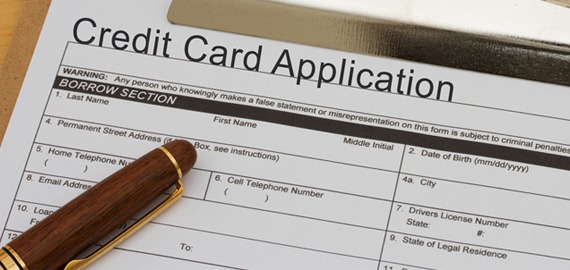
Understanding why your credit card was declined is the first step in preventing it from happening again. Lack of funds, international purchases, or simply an expired card could be to blame.
The English language has seven words, which, when spoken together, will nearly always ruin the day of the person on the receiving end of them. That fateful sentence? "I'm sorry, your card has been declined."
It can happen without warning. Maybe you're at Starbucks, ready to enjoy your morning coffee, or at Best Buy, about to buy the perfect Christmas present for your husband. No matter the situation, when the clerk hands you back your credit card with a shaking head and an apologetic smile, that sinking feeling in your stomach is universal.
Understanding why your card was declined is the first step in preventing it from happening again. I polled the finance experts here at Brad's Deals, and came up with a list of the eight most common reasons why a credit card would be declined:
1. You lack the funds or you've reached your credit limit.
The most simple explanation for a declined credit card is a lack of funds. Most credit card companies will not allow you to make purchases that will push you over your credit limit, so if you haven't been paying close attention to your credit card statements, or haven't made a significant payment in a while, that cap can come up quicker than expected.
This is a problem for debit card users as well, especially if you have overdraft protection enabled on your checking account. While having your debit card declined might be better than overdrawing your account and having to pay the steep overdraft fees charged by your bank, it's still an embarrassing inconvenience.
Avoiding being declined for this reason should be easy enough: just keep better track of your finances. Paying off your credit card in full every month can help you build credit while at the same time stopping any surprise card declines in their tracks. If you can't do that, make a habit of checking your credit card statement or bank balance online before you buy anything. If you don't have the money, you can't make the purchase--it's as simple as that.
2. Your account is delinquent.
Even if you haven't yet reached your credit limit, if you've missed some payments on your card, your credit card company could put a delinquent stamp on your account and prevent you from spending any more until you pay up. If you have really good credit, the card issuer might give you some slack and let you miss multiple payments before they cut you off, but if your credit report is marred with delinquencies, they'll probably put a stop to it after just one or two missed payments.
Having a delinquent account can really do a number on your credit, so if your card is declined for this reason, fixing the problem should be a priority. Pay off your delinquent balance ASAP or face serious credit problems in the future.
3. Misplaced fraud prevention
Make sure you call your credit card company before you take a big trip!
To prevent you from being a victim of identity theft, most banks and credit card companies monitor your spending patterns and locations to ensure that you are the one using your card. If they see purchases being made that don't fit the bill, they might freeze your account. While this is helpful if someone steals your wallet in Minneapolis and then tries to spend $500 the next day at a Target in Chicago, it can be a hassle when traveling or making large, out-of-character purchases.
So if you live in Boston but plan on vacationing in California, call your bank or credit card company before you get on the plane. They'll make a note of the fact that you're going out of state, and green light all the purchases you make while you're there (within your credit limit, of course). Same goes for big buys, like a TV, a down payment on a car, etc. If you're planning on buying something expensive that's not something you'd typically purchase, let your credit card company and bank know beforehand just in case. They might not freeze your account in all cases anyway, but it's better to be safe than to have your card declined while trying to buy something you really want or need.
4. You're making an international purchase.
Making online purchases from a foreign company is another way to set off your bank or credit card company's fraud alarm. While it might be tedious, giving your credit card company a heads up before you make a foreign transaction is probably your best bet. And always make sure to vet overseas websites to make sure they're legit before buying anything from them--online shopping can be a veritable landmine of identity theft just waiting to happen, so make sure you know what you're getting into before giving out your credit card number.
5. There's an authorization hold on your account.
A lot of businesses, like rental car companies and hotels, will put holds on your account when you make your reservation, which can sometimes be as much as a few hundred dollars. While you'll get that money back (when you return the car dent-free or check out without having damaged your hotel room beyond repair), if you're close to your credit limit when you make the reservation, the authorization hold could push you over the top, and cause your credit card to be declined.
It's a good idea to make sure you've got ample credit available before making a purchase or reservation with a company that will put a hold on your account, and you should always ask and make a note of how much the hold will be, and how long it will last so you don't end up getting a surprise decline.
6. Your card is expired.
When you first get a credit card, the expiration date can seem like a long time in the future. Most cards typically expire two to three years from the day they were issued, but if you're not keeping track, those expiration dates can really sneak up on you. If you try to use a card that's expired, it's going to get declined. Some credit card companies stay on top of this stuff and send you a new card in the mail before your old one expires, but others expect you to update your account yourself.
To avoid having your card declined because it's expired, make sure you're up to date on the expiration dates of all your credit and debit cards. If they're almost up, call up your card issuer and ask for a new one. Simple as that.
7. You made a typo on an online form.
I tried to order lunch online yesterday and my debit card was declined. I was worried for a minute, but then remembered I had recently moved and updated my address on my card's account. When filling in the online form, I'd put in my old zip code out of habit, not the new one that was actually attached to my account. This is an easy mistake to make, even if you haven't recently changed your address. Careless typos or even extra spaces left in the address box can cause your card to be declined, so next time you shop online, make sure to double-check that all your info is correct before you press the "order" button.
8. Your bank or credit card company is having technical issues.
Sadly, banks and credit card companies occasionally experience technical issues that interrupt their customers' card service in a certain area, or even across the world. When this happens, there's really nothing you can do but wait it out. Most banks and card issuers take this problem very seriously and will fix it quickly, but in the meantime, you won't be able to make purchases with the affected cards. The best way to be prepared for situations like this (and every other one on this list, too) is to bring back up--be it cash, another card, or a checkbook--you should always have a few different ways to pay on you so you don't get stuck in a sticky situation.
Has your credit card ever been declined? How did you handle it?









